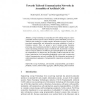Free Online Productivity Tools
i2Speak
i2Symbol
i2OCR
iTex2Img
iWeb2Print
iWeb2Shot
i2Type
iPdf2Split
iPdf2Merge
i2Bopomofo
i2Arabic
i2Style
i2Image
i2PDF
iLatex2Rtf
Sci2ools
ACAL
2009
Springer
2009
Springer
Towards Tailored Communication Networks in Assemblies of Artificial Cells
Abstract. Living Technology is researching novel IT making strong use of programmable chemical systems. These chemical systems shall finally converge to artificial cells resulting in evolvable complex information systems. We focus on procedural manageability and information processing capabilities of such information systems. Here, we present a novel resource-saving formation, processing, and examination procedure to generate and handle single compartments representing preliminary stages of artificial cells. Its potential is exemplified by testing the influence of different glycerophospholipids on the stability of the compartments. We discuss how the procedure could be used both in evolutionary optimization of self-assembling amphiphilic systems and in engineering tailored communication networks enabling life-like information processing in multicompartment aggregates of programmable composition and spatial configuration.
ACAL 2009 | Artificial Cells | Artificial Intelligence | Chemical Systems | Programmable Chemical Systems |
| Added | 08 Sep 2010 |
| Updated | 08 Sep 2010 |
| Type | Conference |
| Year | 2009 |
| Where | ACAL |
| Authors | Maik Hadorn, Bo Burla, Peter Eggenberger Hotz |
Comments (0)

